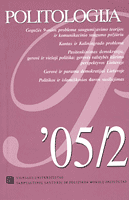Prezidento rinkimai 2002: Lietuva pokomu-nistinių šalių kontekste
Presidential Elections 2002: Lithuania Within the Context of Post-Communist Countries
Author(s): Živilė ŠatūnienėSubject(s): Politics / Political Sciences
Published by: Vilniaus universiteto leidykla & VU Tarptautinių santykių ir politikos mokslų institutas
Keywords: transition period; elections procedures in Lithuania; post-communist politics and societies; Central and Eastern Europe
Summary/Abstract: The article analyses presidential elections 2002 in Lithuania according to their "formal" criteria (e. g. number of candidates, their previous political experience, party membership, etc.) and election-campaign style. During transition period, more than ten years long, Lithuania routinized elections procedures, prevalent in Western democracies. However, the analysis of 2002 presidential elections' "formal" features and the style of election-campaign showed that the elections in Lithuania remained typically "post-communist". High number of candidates, populism, radicalism, personalism, and artificial worsening of the existing level of living characterized presidential elections in Lithuania. All the above mentioned features could also be found in other countries of Central and Eastern Europe as they are caused by specific problems of post-communist politics and societies. When Soviet dominance came to an end, Lithuania adopted too liberal laws regulating the procedure of how a person may nominate him/herself for presidential elections. The principle of representation vs. effectiveness was overestimated in many post-communist countries. Too "soft" requirements for potential presidential candidates caused high number of politicians (or political parties) who wished to participate in elections. Moreover, the abundance of candidates means that radical politicians or "new-comers" to the politics with only negligible initial public support will also take part in elections. It is usual that politicians of that kind are not seeking for support of the "median voter" but instead they adopt positions that are far away from the center in order to maximize their chances of being elected. In that case (as presidential elections in Lithuania 2002 also displayed) during the election campaign it becomes difficult to escape populism, radicalism, and even the cases of artificially dramatizing the existing situation (i. e. negativism). The fact that many individuals in Lithuania as well as other post-communist countries do not identify themselves with a certain political party, and the party system itself is still non-consolidated causes the tendency of elections being highly personalized. During the election campaign in Lithuania 2002 presidential candidates also preferred to demonstrate their personal characteristics instead of competing to each other by suggesting different ideological views and policy perspectives. The increasing "attractiveness" of personalist and majoritarian tendencies among presidential candidates in Lithuania is not conducive to further consolidation of national party system and creation of higher-standard post-communist liberal democracy.
Journal: Politologija
- Issue Year: 2003
- Issue No: 1 (29)
- Page Range: 2-21
- Page Count: 20
- Language: Lithuanian

